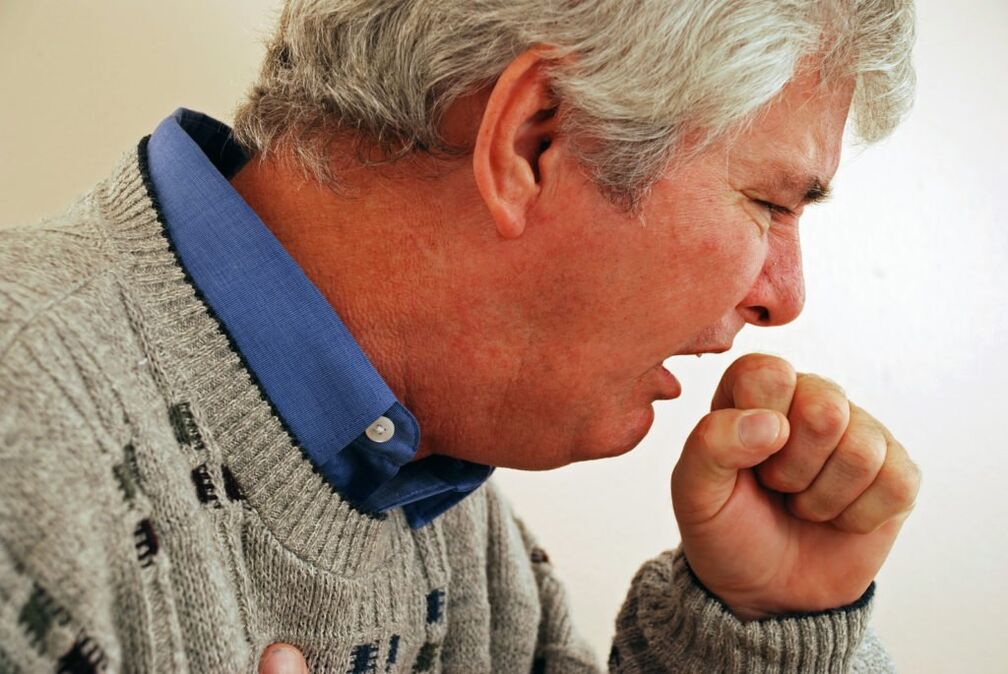Prostatitis - Inflammation of the seed gland (prostate) - prostate.It is the most common disease of the genitourinary system in men.Most of the time it affects patients aged 25 to 50.According to several data, prostatitis suffers from 30-85% of men over 30 years.Perhaps the inflammation of the testicles and appendages, which threatens infertility.The rise of the infection leads to the inflammation of the upper parts of the genitourinary system (cystitis, pyelonephritis).

Prostatitis symptoms
In rare cases, chronic prostatitis becomes the result of an acute process, however, as a general rule, a primary chronic course is observed.The temperature occasionally increases to subfebrile values.The patient indicates weak pain in the perineum, discomfort during the act of urine and defecation.The most characteristic symptom is the scarce discharge of the urethra during the defecation act.The primary chronic form of the disease develops for a significant period of time.It is preceded by prostatosis (stagnation of blood in the capillaries), gradually becoming abacerial prostatitis.
Chronic prostatitis is often a complication of the inflammatory process caused by the causal agent of a specific infection (chlamydia, tricomonas, ureplasma, gocococcus).The symptoms of a specific inflammatory process in many cases mask the manifestations of the prostate injury.A slight increase in pain is possible during urination, weak pain in the perineum, the scarce discharge of the urethra during defecation.A slight change in the clinical picture often goes unnoticed by the patient.
Impotence, and sometimes the threat of possible sexual disorders is difficult to transfer to patients.There is often a change in character, irritability, complaints, excessive concern with their own health and even the "departure towards the disease."
If the development of prostatitis suspects a man, it is immediately offered to undergo a differential diagnosis.It allows you to distinguish the inflammation of the prostate gland from other pathological conditions that have similar symptoms with it.
Without diagnoses, the doctor cannot distinguish prostatitis from diseases such as urethritis, pyelonephritis, orchitis, cystitis and epidmit.
Chronic prostatitis can be confused with prostate adenoma or malignant tumor in this organ.In the last case, the patient will have a significant blood loss during urination and a notable deterioration in the general state of health.

The typical symptoms of acute bacterial prostatitis are:
- frequent urine;
- burning during urine (usually with a small amount of urine);
- pain in the bladder and perineum area;
- pain during defecation;
- nausea, vomiting;
- Fever and chills.
Chronic bacterial prostatitis is also manifested by pain and urination problems.However, these symptoms disappear immediately and then appear after a while.Chronic prostatitis is characterized by a recurring course with the inflammation of fading and reimbursement.It can last for many months.
In rare cases, the doctor can detect a greater amount of leukocytes in ejaculate or the secretion of the prostate gland, but a sick person may not feel pain or other symptoms of inflammation of the prostate.
So what signs of prostatitis should pay special attention?The initial manifestations of the disease:
- Pull pain in the perineum and the pubic;
- discomfort during urination, after intimate contacts;
- brokenness, weakness;
- A slight increase in temperature.
Prostatitis symptoms in men in a parenchymal way:
- serious condition of the patient;
- At the beginning of the disease, fast urine moves quickly to dysuria (complete urinary retention);
- The appetite is reduced, the patient is tormented by thirst;
- flatulence, the inability to empty intestines due to severe pain;
- The mucosa discharge of the rectum may appear;
- Body temperature increases, remains within 39 ° C.
One of the signs of prostatitis in men in this severe way is the acute pain of the prostate gland when probe.The patient's stick exam at this stage of the inflammatory process is difficult due to a serious condition and uncomfortable sensations in the genital area.If the qualified treatment does not begin at this stage, the disease can be complicated by the transition from the infection to the neighboring organs, the appearance of an abscess or the development of a chronic inflammatory process.
Diagnosis
<>A characteristic clinical image simplifies the diagnostic process in acute and chronic prostatitis.Mandatory is done:
- Rectal prostate study
- The fence of the prostate gland to determine the sensitivity of microflora (sow the secret of the prostate and bacterial urine).
- An ultrasound of the prostate is carried out to identify structural changes (tumors, cysts, adenoma) and differentiation of prostatitis of other diseases
- A sperm to exclude or confirm the development of infertility.

To confirm the diagnosis, the doctor can also analyze the urine and take the patient's blood to examine the level of inflammatory cells.
Additional diagnostic methods for symptoms of inflammation of the prostate in men:
- Study of the prostate secret;
- laboratory diagnosis;
- PCR research;
- Prostate ultrasound;
- Uroofloometry;
- Magnetic resonance, computed tomography of the pelvic organs.
Treatment: Basic and not specific therapy
Treatment of acute prostatitis
Patients with an acute process without complications undergo a treatment course with an urologist outpatiently.With severe poisoning, the suspicion of a purulent process, hospitalization is indicated.Antibacterial therapy is carried out.The medications are selected taking into account the sensitivity of an infectious agent.Antibiotics are widely used that they can penetrate well into the prostate tissue (ciprofloxacin, etc.).
With the development of an acute delay in urine in the FNU of prostatitis, they resort to the installation of Cístostom, and not to a urethral catheter, because there is the danger of the formation of an abscess of the prostate.With the development of the abscess, an endoscopic transuretral or transureral opening of the abscess is carried out.
Treatment of chronic prostatitis
The treatment of chronic prostatitis should be complex, including ethiotropic therapy, physiotherapy, immunity correction:
- Antibiotic therapyThey are prescribed long-term antibacterial courses (within 4-8 weeks).The selection of the type and dose of antibacterial drugs, as well as the determination of the duration of the treatment course is carried out individually.The medicine is chosen based on the sensitivity of microflora depending on the results of the sowing of urine and the secret of the prostate.
- Prostate massage.The gland massage has an integral effect on the affected organ.During the massage, the inflammatory secret accumulated in the prostate gland is squeezed in the ducts, then enters the urethra and takes off the body.The procedure improves blood circulation in the prostate, which allows to minimize stagnation and provides the best penetration of antibacterial drugs in the tissue of the affected organ.
- Physiotherapy.To improve blood circulation, laser exposure, ultrasonic waves and electromagnetic vibrations are used.If it is impossible to carry out physiotherapeutic procedures, the patient is prescribed warm medicinal microclines.
In long -term chronic inflammation, a consultation of an immunologist is indicated for the choice of tactics of immunocoria therapy.The patient receives recommendations for a change in lifestyle.The introduction of certain changes in the lifestyle of a patient with chronic prostatitis is therapeutic and a preventive measure.The patient is recommended to normalize sleep and vigil, establish a diet and perform moderate physical activity.
In no case should the treatment be treated at home, since it is impossible to cure the disease acutely with the help of traditional medicine.The chronic inflammatory process requires the intervention of experienced specialists.Modern treatment medications allow you to quickly and effectively relieve the inflammatory process and avoid the development of dangerous complications.
The following funds are used to treat prostate inflammation:
- Antibacterial, antifungal, antitrichomonna drugs (depending on the cause of disease development);
- antispasmodics, analgesics;
- Physiotherapeutic methods.

Therefore, urologists recommend contacting doctors as soon as the first signs of prostatitis occur in a man.This will win time.The treatment with makeshift media, at home, is strictly contraindicated.
Prostate massage
Patients with chronic prostate inflammation massage gland.This procedure must be carried out only by experienced specialists, since it is a powerful treatment agent that improves the exit of the purulent inflammatory secrets of the ducts.
The prostate massage refers to a complex treatment and diagnostic procedure, which professionals should only carry out.It is carried out through the rectum.The organs of the organ are massage with fingers, stimulating blood circulation and the output of prostate secretion, whose study is required for many diseases of the genitourinary sphere.The massage releases the ducts of the accumulation of PU, relieves stagnation, reduces manifestations of infectious and inflammatory processes.
Knowing what the first signs of male prostatitis have, a person can reveal them in a timely manner and consult a doctor.
Complications
If you do not pay attention to the signs and symptoms of prostatitis, the infection is possible to other organs of the pelvic region, intense pain with urine and the appearance of blood and pus in the urine and pus can occur.In a careless way, temperature with prostatitis in men increases, it worsens work significantly.
The main complications of prostatitis:
- Vesiculite (inflammation of seed bubbles);
- prostate sclerosis;
- Prostate abscess;
- prostate cysts;
- sterility;
- impotence;
- Purulent infections of neighboring organs.
But the most formidable complication is considered gland hyperplasia with an increase in the risk of growth of malignant tumors.A man often does not even know about the growth of adenoma and cancer neoplasms until they reach impressive sizes and there are no difficulties in the urine.
In the absence of timely treatment of acute prostatitis, there is a significant risk of developing the abscess of the prostate gland.When the purulent approach is formed, the patient's body temperature increases to 39-40 ° C and can acquire an agitated character.Heat periods alternate with pronounced chills.Acute pain in the perineum complicates urination and makes defecation impossible.
For chronic prostatitis, a wave -shaped course with prolonged remissions periods is characteristic, during which inflammation in the prostate occurs latent or manifests in extremely scarce symptoms.Patients, whom nothing gets upset, often stops treatment and becomes only the development of complications.
Prostatitis therapy with popular remedies
Popular remedies for prostatitis serve as an alternative to pharmacological therapy.They are used for bacterial prostatitis.Before using popular remedies, consult a doctor.
Green tea
Green tea medications are probably the most pleasant way to treat prostatitis.It is advisable to drink 3 cups of green tea per day.This drink contributes to frequent urination, which helps clean the entire body.In addition, green tea is directly involved in body detoxification.
Nettle
2 handfuls of newly raised orthiga leaves, about 15 cm from the top of the plant, 300 ml of drinking water must be poured and let in the night (approximately 12 hours).In the morning, the infusion must be slightly hot and drink.
Blueberry
Cranberry is one of the famous combatants against prostatitis.House treatment with blueberries implies its use dry, fresh and canned.In the last case, however, added sugar must be careful.
Bulls juices are also available in stores.Caution must also be careful here and carefully read the label so that juice does not contain additional juices of other artificial fruits or sweeteners.
Extremely 100% blueberry juice has healing effects.

Ginger
When dealing with prostatitis, you can pay attention to another useful product: the ginger root.Ginger is a promising product for the treatment of this disease.It has a powerful anti -inflammatory effect and antioxidant properties, interrupts the reproductive cycle of cancer cells (which is especially important in the treatment of prostate cancer) and promotes apoptosis.Along with this, ginger is not toxic to other rapidly growing cells.
It should be taken after eating, adding the root to tea (preferably green).
Chestnuts
The chests are not effective either, they have no side effects, which is very important for the elderly.The peel must be removed from chestnuts, and the nucleus in itself must be crushed into small pieces, pour boiling water and let it prepare an hour.The decoction must be taken 3 times a day before meals, 30 drops.
Regular sex
Regular sex, similarly, such as masturbation, cleanses the prostate, promotes blood circulation and prevents local inflammation.




































